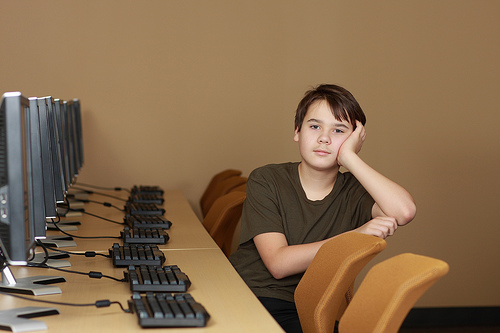The Internet has always been scary for parents of young children. The problem is that it’s getting worse because it’s easier for your child to make a Facebook account and talk to anyone in the world. While the scary reality is that your child may find an online predator, there are a few things that you should keep in mind to avoid this and other dangerous scenarios. Your child should have independence online, but you also need to ensure that he or she is doing the right thing with social media.
Social Sites for Kids
If you have a young child, then don’t let him or her join Facebook, Twitter or other general social media sites just yet. Not only is your child not ready for that level of exposure, but you also need to help him or her foster good browsing behaviors. Start with a kid-friendly social network. There are plenty of social networks that cater to younger children without being condescending. They are often like regular social networks, but they closely watch what people say so that dangerous situations are avoided.
For example, the website might restrict members from using curse words, discussing contact details or trading pictures.
Parental Controls
One of the scariest things about social media is how easy it is to access. Your child doesn’t have to sit in front of the computer to use Facebook. He or she can simply use their smartphones and tablets to go online. Many children that are 10 years old now have access to mostly unfiltered social networks.
If your child has a mobile device, it’s imperative that you install parental controls on them. There are a variety of reliable and nifty Android, iPhone and iPad parental controls available these days, making it possible and convenient for you to supervise and protect your little ones. These controls offer you a peace of mind by empowering you to entirely block access to certain social media apps and websites, while also giving you a detailed view of their activities, including conversations and images, on popular social networking sites so that you may make a timely intervention when it becomes necessary.
Good Browsing Behavior
You should talk to your child about the difference between good and bad social media behavior. This isn’t so much about your child being mean online to other people, but ensuring that your child doesn’t do something potentially dangerous. For example, tell him or her to create a nickname and to never share contact details. There are dangerous people on the Internet, and your child needs to know that this is serious.
You should also tell your child to avoid uploading pictures of him or herself. Downloads should also be restricted so that he or she doesn’t give the computer a virus.
Learn About the Website
Children, especially teens, want their privacy. They don’t want you butting into their business. This is a natural part of growing up, but it can be dangerous at times. Your child will often try to hide things by relying on your ignorance of the website. For example, the child might use private messages to speak with friends so that you can’t track the conversations.
If you want to ensure that your child is safe, then you might want to learn about the social network that he or she is using. This will let you know what loopholes your child might use to avoid you prying into his or her privacy. This also gives you a chance to see the caliber of people that are following your child online.
Conclusion
Allowing your child to access social media websites can be stressful because they can be so dangerous. At the same time, it’s important to give your child some privacy. If you want to make things as easy as possible, then be sure to pick the right social media website, learn about the social network and use parental controls if needed to restrict online usage. Also when you are looking for internet bundle deals, talk to your providers and see what they have in mind about online access to protect kids.

